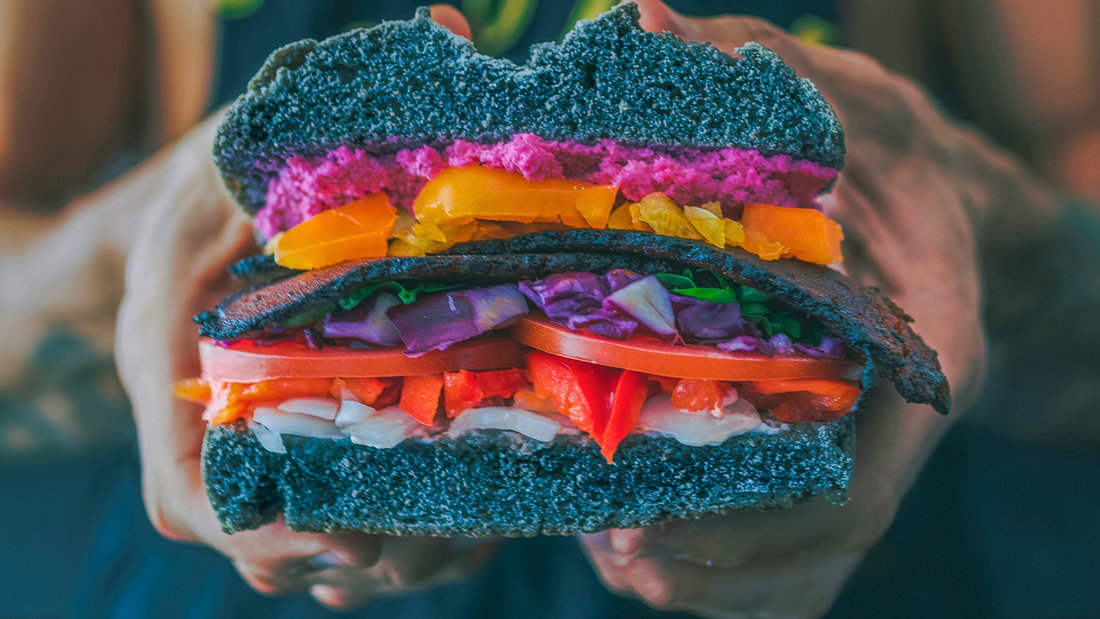Implementing a Plant-based Crew Menu at Least Once a Week Makes a Bigger Impact Than You Think.
At Small Vegan Kitchen, we boldly advocate a meaningful and sustainable approach to crew meals. Implementing a plant-based menu onboard, even just once a week, holds significant potential.
In this article we explore the practicalities and impact of this simple choice, setting the course for a greener future in the yachting industry. And because we are so passionate about the cause and want you to make a success of it, we are giving you our 6-step Plan to Successfully Implement Change to help you on your way.

Making a world of a difference.
By simply offering a plant-based menu, you can reduce the yacht's ecological footprint, and also provide nutritious options that promote well-being.
According to the Meat-free Mondays impact calendar, the average meat eater requires 16 Olympic swimming pools of water to produce the meat that they will eat in their lifetime.
So Just one day a week dedicated to serving meat-free crew meals for a crew of 8 saves the equivalent of 6314 bathtubs of water, and you effectively create an 11.7m2 marine reserve for every day you do not eat meat, dairy and fish products! *Data taken from the Meat Free Monday impact calculator.
It makes sense to bring about such an impactful change and to adopt eco-friendly practices. By making your actions sustainable, you are well on your way towards a greener galley. The ripple effect directly touches one of the most crucial elements of your yacht, the crew. Offering nutritious plant-based meals promotes well-being and provides significant health benefits that are backed by science.

Whilst some chefs are already offering a meat-free day it is certainly not an industry standard. We explore the reasons why it is the right thing to do.
Health Benefits
It is undeniable. The science is leaning towards a wholefood plant-based diet reducing meat, dairy and fish consumption. The benefits are tenfold and the ripple effect of minimising our dependence on animal products as a food source affects not only our health, but the well-being of our planet.
By switching to a plant-based diet, you are reducing your risk of cardiovascular disease, and type 2 diabetes. Since plants do not contain cholesterol, consuming a plant-based diet naturally eliminates dietary cholesterol intake, and that in turn can contribute to improved heart health. Additionally, plant-based diets are typically higher in fibre, vitamins, and minerals, aiding kidney function and weight management. These are all valid reasons to nourish the crew with foods that help them stay healthy.
Sustainability
There are devasting environmental impacts of meat production, including deforestation, greenhouse gas emissions, and water usage. The figures are alarming and even the smallest of our actions can help improve the situation. The impact calculator (found on the meat-free Monday website) is a great way to monitor your yacht’s contribution and motivate you and your crew to continue on your plant-based path.
Crew Morale and Productivity
Offering a variety of plant-based meals can enhance crew morale by accommodating diverse dietary preferences and promoting a healthier lifestyle. A well-fed and satisfied crew is more likely to be productive, efficient, and cohesive on board.
Cost Savings
Incorporating more plant-based ingredients can lead to cost savings in the yacht's provisioning budget. Plant-based proteins like beans, lentils, and tofu are often more affordable than meat and seafood, allowing for greater flexibility in menu planning.
A practical method for tracking this is by monitoring your current monthly expenditure. By doing so, you can compare it with the cost of implementing a plant-based menu. This serves as an indicator of how transitioning to a plant-based weekday routine impacts and reduces your budget. It's worth noting that while the initial setup costs may not immediately reflect a change, the benefits will certainly become apparent over the medium and long term.

Science-backed Trend Towards Plant-Based Eating
There is a growing trend towards plant-based eating globally, driven by concerns for health, sustainability, and animal welfare. Offering a Meat Free Day aligns with this and underscores the yacht's dedication to addressing climate change. As diversity becomes more prevalent in yachting, so too will dietary habits, which could enhance the appeal of your yacht to prospective crew members.
Creative Culinary Opportunities
There is no doubt that a plant-based menu is just as delicious, diverse, and visually appealing as traditional meat-based dishes. It is a great opportunity for you as chef to showcase your culinary creativity and be inspired to experiment with new ingredients, flavours, and cooking techniques.
Promoting Well-Being Onboard
At Small Vegan Kitchen we believe in the importance of promoting holistic well-being among the crew, including physical health, mental clarity, and emotional balance. Plant-based meals can contribute to overall wellness by providing nutrient-rich, energising, and satisfying options.

Industry Recognition
Leading restaurants, hotels, and catering services worldwide have already embraced Meatless Monday as part of their culinary offerings. By adopting this practice, superyacht chefs can position themselves as forward-thinking and environmentally responsible leaders in the industry. It certainly helps set out your profile from the rest and the transferable skills that come with measurable change management are favoured and highly sought-after, should you be looking for a new role in the future.
So, if offering a meat-free day is something you are interested in organising but not sure where to start then read on, help is at hand. Follow our six simple and proven steps to guide you from start to success.

1. Start at the Beginning.
There are heaps of great resources out there to help you plan your plant-based day. Here are our two favourite websites to help you get started.
meatfreemondays.com and mondaycampaigns.org/meatless-Monday
They are succinct, easy to follow and give you some great resources to help you navigate the transition.
If you would rather have someone guide you through the process, then join Small Vegan Kitchen's 'Wellness Wednesday for Superyacht Chefs' where you can connect with other chefs, and share best practices. You also can get access to personalised coaching sessions both before and during the set up phase to help overcome any obstacles that you might face.
2. Involve the Crew
Success doesn't just come from having great ideas; it's about effectively communicating them and inspiring others to join your cause. To enlist support, it's beneficial to sow the seeds of your ideas first. Start by asking others how they feel about the idea, to gauge their reaction. If there's resistance, take the time to understand their concerns and provide support and factual information to address them. This approach fosters understanding and collaboration, increasing the likelihood of accepting and adopting your ideas.
Providing crew with clear information can significantly increase cooperation and acceptance. Letting them know when you plan to start implementing the idea and suggesting a specific duration for a trial period helps set expectations and gives people a sense of control.
3. From Plan to Planning
"Plans are nothing; planning is everything." - Dwight D. Eisenhower
Once you've committed to introducing plant-based meals for your crew, determine which day or days will be dedicated to this change. This may vary depending on your schedule and preferences for each yacht.
Next, plan plant-based alternatives for the meals and snacks typically offered. Identify the crew's favorite meals and snacks and seek out plant-based alternatives, utilising ingredients like chickpeas, beans, lentils, or tofu as protein sources. You'll be pleasantly surprised by how straightforward and tasty it is to re-create meat and fish dishes using whole-food plant-based alternatives.
Successful change occurs from subtle differences.

4. Provisioning
Most supermarkets stock a wide range of plant-based ingredients. Zero waste shops are a great alternative to supermarkets and reduce the need for single-use plastic, you will generally find all the herbs, spices, grains, legumes, beans and lentils you will need as well as sugars, and flours. Farmers markets are a way to support local farmers who will no doubt be able to deliver directly to your yacht.
If you have the time and resources making your own tofu from soy or chickpeas, your own plant-based milks and crew snacks like bliss balls, cookies, muesli bars and chocolate treats rather than buying is a great way to ensure nutritional quality and reduce single-use packaging.

5. Evaluate and Adjust.
"Feedback is the breakfast of champions." - Ken Blanchard
Asking for feedback is essential for implementing lasting change. Whether it is through face-to-face conversations or anonymous surveys, it demonstrates to the crew that you value their input and are committed to understanding how changes affect them. It's important not to take feedback personally, but rather to see it as an opportunity to address valid concerns. By acknowledging their comments and showing a willingness to listen, you can build trust and encourage support for your ideas for a plant-based weekly crew menu.

6. Celebrate The Success
We often get caught up in the hustle and bustle of daily tasks, it's easy to lose sight of our progress. Take a moment to pause and reflect on how far you've come. Acknowledge your achievements and celebrate your success!
Founder of Small Vegan Kitchen, Sarah is a sailor, certified coach and qualified plant-based nutrition specialist, assisting and guiding chefs to integrate whole food plant-based nutrition to improve well-being, enhance performance, and create a greener galley.
She lives aboard her sailing boat with her family as they travel around the world and sees first hand the impact of climate change and the need for more sustainable practices in the yachting industry.

If you want to know more about the work Sarah does, her informative webinars, courses and coaching, please visit her website or email her on smallvegankitchen@gmail.com
https://www.linkedin.com/in/sarahpowellfowler/
Instagram: @smallvegankitchen
Facebook: @smallvegankitchen
I




